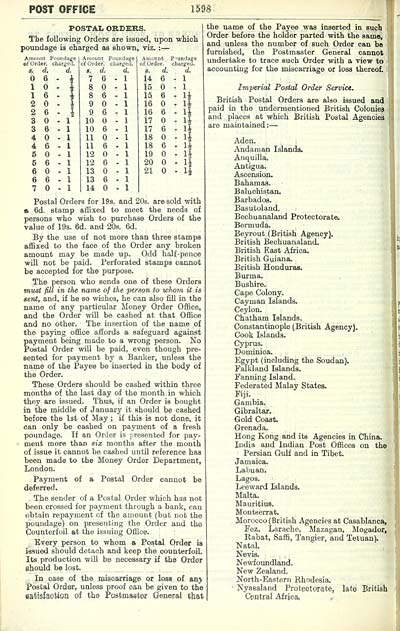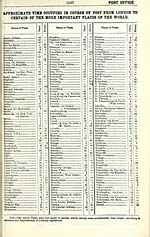Download files
Complete book:
Individual page:
Thumbnail gallery: Grid view | List view

POST OFFICE
1598
POSTAL ORDERS.
The following Orders are issued, upon which
poundage is charged as shown, viz. : —
1
1
14
i*
i*
i*
H
Amount Poun
dage
Amount Po
indagre
Amount P'i
of Order.
:harged.
of Order, charged.
ofOrd
er. ch
S. «'.
a.
t. d.
d.
s.
d.
6
.
4
7 6 -
14
6 -
1
.
4
8 ■
15
-
1 6
.
4
8 6 ■
15
6 -
2
.
4
9 ■
16
-
2 6
.
4
9 6 •
16
6 -
3
.
10
17
-
3 6
.
10 6
17
6 -
4
.
11
18
-
4 6
.
11 6
18
6 •
6
.
12
19
-
5 6
.
12 6
20
-
6
.
13
21
-
6 6
.
13 6
7
-
14
14
14
Postal Orders for 19s. and 20s. are sold with
a 6d. stamp affixed to meet the needs of
persons who wish to purchase Orders of the
value of 19s. 6d. and 20s. 6d.
By the use of not more than three stamps
affixed to the face of the Order any broken
amount may be made up. Odd half-pence
will not be paid. Perforated stamps cannot
be accepted for the purpose.
The person who sends one of these Orders
must fill in the name of the person to whom it is
sent, and, if he so wishes, he can also fill in the
name of any particular Money Order Office,
and the Order will be cashed at that Office
and no other. The insertion of the name of
the paying office affords a safeguard against
payment being made to a wrong person. No
Postal Order will be paid, even though pre-
sented for payment by a Banker, unless the
name of the Payee be inserted in the body of
the Order.
These Orders should be cashed within three
months of the last day of the month in which
they are issued. Thus, if an Order is bought
in the middle of January it should be cashed
before the 1st of May ; if this is not done, it
can only be cashed on payment of a fresh
poundage. If an Order is presented for pay-
ment more than six months after the month
of issue it cannot be cashed until reference has
been made to the Money Order Department,
London.
Payment of a Postal Order cannot be
deferred.
. The sender of a Postal Order which has not
been crossed for payment through a bank, can
obtain repayment of the amount (but not the
poundage) on presenting the Order and the
Counterfoil at the issuing Office.
Every person to whom a Postal Order is
issued should detach and keep the counterfoil.
Its production will be necessary if the Order
should be lost.
In case of the miscarriage or loss of an>
Postal Order, unless proof can be given to the
gatisfaotion of the Postmaster General that
the name of the Payee was inserted in such
Order before the holder parted with the same,
and unless the number of such Order can be
furnished, the Postmaster General cannot
undertake to trace such Order with a view to
accounting for the miscarriage or loss thereof.
Imperial Postal Order Service.
British Postal Orders are also issued and
paid in the undermentioned British Colonies
and places at which British Postal Agencies i j
are maintained: —
Aden.
Andaman Islands.
Anquilla.
Antigua.
Ascension.
Bahamas.
Baluchistan.
Barbados.
Basutoland.
Bechuanaland Protectorate.
Bermuda.
Beyrout (British Agency).
British Bechuanaland.
British East Africa.
British Guiana.
British Honduras.
Burma.
Bushire.
Cape Colony.
Cayman Islands.
Ceylon.
Chatham Islands.
Constantinople (British Agency}.
Gook Islands.
Cyprus.
Dominica.
Egypt (including the Soudan).
Falkland Islands.
Fanning Island.
Federated Malay States.
Fiji.
Gambia.
Gibraltar.
Gold Coast.
Grenada.
Hong Kong and its Agencies in China.
India and Indian Post Offices on the
Persian Gulf and in Tibet.
Jamaica.
Labuan.
Lagos.
Leeward Islands.
Malta.
Mauritius.
Montserrat.
Morocco ( British Agencies at Casablanca,
Fez, Larache, Mazagan, Mogador,
Rabat, Saffi, Tangier, and Tetuan).
Natal.
Nevis.
Newfoundland.
New Zealand.
North-Eastern Rhodesia.
1 Nyasaland Protectorate, late British
Central Africa,
I
1598
POSTAL ORDERS.
The following Orders are issued, upon which
poundage is charged as shown, viz. : —
1
1
14
i*
i*
i*
H
Amount Poun
dage
Amount Po
indagre
Amount P'i
of Order.
:harged.
of Order, charged.
ofOrd
er. ch
S. «'.
a.
t. d.
d.
s.
d.
6
.
4
7 6 -
14
6 -
1
.
4
8 ■
15
-
1 6
.
4
8 6 ■
15
6 -
2
.
4
9 ■
16
-
2 6
.
4
9 6 •
16
6 -
3
.
10
17
-
3 6
.
10 6
17
6 -
4
.
11
18
-
4 6
.
11 6
18
6 •
6
.
12
19
-
5 6
.
12 6
20
-
6
.
13
21
-
6 6
.
13 6
7
-
14
14
14
Postal Orders for 19s. and 20s. are sold with
a 6d. stamp affixed to meet the needs of
persons who wish to purchase Orders of the
value of 19s. 6d. and 20s. 6d.
By the use of not more than three stamps
affixed to the face of the Order any broken
amount may be made up. Odd half-pence
will not be paid. Perforated stamps cannot
be accepted for the purpose.
The person who sends one of these Orders
must fill in the name of the person to whom it is
sent, and, if he so wishes, he can also fill in the
name of any particular Money Order Office,
and the Order will be cashed at that Office
and no other. The insertion of the name of
the paying office affords a safeguard against
payment being made to a wrong person. No
Postal Order will be paid, even though pre-
sented for payment by a Banker, unless the
name of the Payee be inserted in the body of
the Order.
These Orders should be cashed within three
months of the last day of the month in which
they are issued. Thus, if an Order is bought
in the middle of January it should be cashed
before the 1st of May ; if this is not done, it
can only be cashed on payment of a fresh
poundage. If an Order is presented for pay-
ment more than six months after the month
of issue it cannot be cashed until reference has
been made to the Money Order Department,
London.
Payment of a Postal Order cannot be
deferred.
. The sender of a Postal Order which has not
been crossed for payment through a bank, can
obtain repayment of the amount (but not the
poundage) on presenting the Order and the
Counterfoil at the issuing Office.
Every person to whom a Postal Order is
issued should detach and keep the counterfoil.
Its production will be necessary if the Order
should be lost.
In case of the miscarriage or loss of an>
Postal Order, unless proof can be given to the
gatisfaotion of the Postmaster General that
the name of the Payee was inserted in such
Order before the holder parted with the same,
and unless the number of such Order can be
furnished, the Postmaster General cannot
undertake to trace such Order with a view to
accounting for the miscarriage or loss thereof.
Imperial Postal Order Service.
British Postal Orders are also issued and
paid in the undermentioned British Colonies
and places at which British Postal Agencies i j
are maintained: —
Aden.
Andaman Islands.
Anquilla.
Antigua.
Ascension.
Bahamas.
Baluchistan.
Barbados.
Basutoland.
Bechuanaland Protectorate.
Bermuda.
Beyrout (British Agency).
British Bechuanaland.
British East Africa.
British Guiana.
British Honduras.
Burma.
Bushire.
Cape Colony.
Cayman Islands.
Ceylon.
Chatham Islands.
Constantinople (British Agency}.
Gook Islands.
Cyprus.
Dominica.
Egypt (including the Soudan).
Falkland Islands.
Fanning Island.
Federated Malay States.
Fiji.
Gambia.
Gibraltar.
Gold Coast.
Grenada.
Hong Kong and its Agencies in China.
India and Indian Post Offices on the
Persian Gulf and in Tibet.
Jamaica.
Labuan.
Lagos.
Leeward Islands.
Malta.
Mauritius.
Montserrat.
Morocco ( British Agencies at Casablanca,
Fez, Larache, Mazagan, Mogador,
Rabat, Saffi, Tangier, and Tetuan).
Natal.
Nevis.
Newfoundland.
New Zealand.
North-Eastern Rhodesia.
1 Nyasaland Protectorate, late British
Central Africa,
I
Set display mode to: Large image | Transcription
Images and transcriptions on this page, including medium image downloads, may be used under the Creative Commons Attribution 4.0 International Licence unless otherwise stated. ![]()
| Scottish Post Office Directories > Towns > Glasgow > Post-Office annual Glasgow directory > 1908-1909 > (1618) |
|---|
| Permanent URL | https://digital.nls.uk/86460946 |
|---|
| Description | Directories of individual Scottish towns and their suburbs. |
|---|
| Description | Around 700 Scottish directories published annually by the Post Office or private publishers between 1773 and 1911. Most of Scotland covered, with a focus on Edinburgh, Glasgow, Dundee and Aberdeen. Most volumes include a general directory (A-Z by surname), street directory (A-Z by street) and trade directory (A-Z by trade). |
|---|


